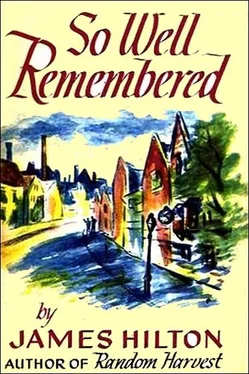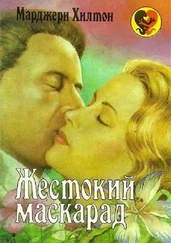Джеймс Хилтон - So Well Remembered
Здесь есть возможность читать онлайн «Джеймс Хилтон - So Well Remembered» весь текст электронной книги совершенно бесплатно (целиком полную версию без сокращений). В некоторых случаях можно слушать аудио, скачать через торрент в формате fb2 и присутствует краткое содержание. Год выпуска: 1945, Жанр: Проза, на английском языке. Описание произведения, (предисловие) а так же отзывы посетителей доступны на портале библиотеки ЛибКат.
- Название:So Well Remembered
- Автор:
- Жанр:
- Год:1945
- ISBN:нет данных
- Рейтинг книги:5 / 5. Голосов: 1
-
Избранное:Добавить в избранное
- Отзывы:
-
Ваша оценка:
- 100
- 1
- 2
- 3
- 4
- 5
So Well Remembered: краткое содержание, описание и аннотация
Предлагаем к чтению аннотацию, описание, краткое содержание или предисловие (зависит от того, что написал сам автор книги «So Well Remembered»). Если вы не нашли необходимую информацию о книге — напишите в комментариях, мы постараемся отыскать её.
So Well Remembered — читать онлайн бесплатно полную книгу (весь текст) целиком
Ниже представлен текст книги, разбитый по страницам. Система сохранения места последней прочитанной страницы, позволяет с удобством читать онлайн бесплатно книгу «So Well Remembered», без необходимости каждый раз заново искать на чём Вы остановились. Поставьте закладку, и сможете в любой момент перейти на страницу, на которой закончили чтение.
Интервал:
Закладка:
He said again: “I’m sorry.” But in his look there was still the absence of any surrender.
She returned that look for an instant, then quietly went out of the room.
Yet left alone, he had no sense of victory—only a feeling of emptiness that made him wonder if the issue had been worth facing at all.
Would he, despite the stand he had taken, visit Richard Felsby again?
The next morning, after a troubled night of thinking the matter over, he was still unsure, and to the end of his life he did not know what he would have done eventually; for on the evening of that next day Richard Felsby died peacefully in his sleep.
A few weeks later George happened to meet Ferguson, the lawyer who was settling the estate. “Too bad, George,” he commented. “You nearly pulled it off.”
“Pulled what off?”
“You nearly got that park.” Then Ferguson explained in confidence that a few days before he died Felsby had talked about leaving some land as a gift to the town, but on one condition—“and this’ll make you sit up, George—on condition that it’s called ‘The Channing Memorial Park’! You’d have had a fine job persuading Browdley to THAT—some of them have enough to remember the name Channing by, without a park… Perhaps it’s just as well he didn’t have time to give me definite instructions.”
“Aye,” said George, “it’d have put me in a tight corner.” But then he began to laugh. “And that’s just where he wanted me, the old devil…”
Ferguson went on: “As matters stand, his housekeeper gets the lot, and SHE’S made a will leaving everything to a training college for Methodist ministers… So there goes the last of the Channing and Felsby fortunes, George—and you can add that to your lecture on ‘Browdley Past and Present’!”
The child was called Martin (Livia’s choice) and took after George, in appearance at least, enough to have given the old man a measure of sardonic satisfaction. During the first year of his life Martin grinned far oftener than he cried, almost as if he knew he had been born on the day his father only narrowly missed becoming a member of Parliament; and when George grinned back, it was as if to say: Don’t worry, I’ll manage it next time. But political affairs are incalculable, and as events developed, it began to seem highly unlikely that any next time would come soon.
This revived Livia’s plea that George should pack up and leave Browdley. He tried to avoid serious argument on the issue, yet it was clear his attitude had not changed, and there grew a hard core of deadlock between them, always liable to jar nerves and send off sparks if any subordinate differences occurred. They did occur, as in all married lives; nevertheless, by and large, Councillor and Mrs. Boswell could have been called a fairly happy couple—except on those few occasions when they could have been called Councillor and Mrs. Boswell. For Livia’s dislike of the town made her scorn the slightest official recognition of her existence. After a few experiments, she declined to attend civic functions so persistently that George ceased to ask her, and in the end she was not even invited. This must have helped rather than hindered him, for Livia was still unpopular in Browdley, especially when the world-wide post-war depression brought sudden distress to the town. It was easy to choose a local name as a scapegoat —easier than to figure what the whole thing was about. And who COULD figure what the whole thing was about, anyway?
George evidently thought he could, for on a certain day in July, 1920, he wrote the following in one of his Guardian editorials:
“The signing by Germany of the protocol containing the disarmament terms of the Allies marks another landmark on the long road towards world recovery. There are some who profess to be concerned about the future of thousands of workers in the arms industry if production is cut down to a minimum; but to that na ve misgiving every economist and social worker has a ready answer. For the real wealth of the world consists, not merely in things created by hand or brain, but in things so created THAT ARE WORTH CREATING. For this reason we may regard yesterday’s event as a step not only towards peace, but BECAUSE of that, towards PROSPERITY.”
George himself needed a step towards prosperity as much as anyone, for his paper was losing both circulation and advertising revenue, and he found himself suddenly on the edge of a precipice which a financially shrewder man would have foreseen. Everything then happened at once, as it usually does; people to whom he owed money (the bank, the newsprint company, the income-tax authorities) demanded payment; those who owed George money, and there were hundreds of them, made excuses for further delay. In this crisis Livia stepped into the breach and proved herself, to George’s utter astonishment, a thoroughly capable business woman. The first thing she did was to produce some sort of order in the printing-office, where Will Spivey’s slackness had held sway for years. By making Will’s life a misery she pared expenses to a minimum and increased the margin of profit on whatever small printing orders came in. Then she began a campaign to secure at least part payment of what was owing, while at the same time she made contact with creditors and persuaded most of them to have patience. Altogether it was an excellent job of reorganization, carried out so expeditiously that George made the mistake of supposing that she enjoyed doing it.
“The fact is, I’m not cut out for business,” he admitted, after congratulating her on having saved the Guardian from bankruptcy.
“And do you think I am? Do you think I LIKE asking Browdley people for favours? Do you really think I’m doing this for your sake or my sake or for your old Guardian?”
There was another thing that she did. It so happened that Councillor Whaley carried influence at the bank where the Guardian had an overdraft, and with this in mind, Livia readily agreed to something she had long balked at, and that was simply to have Councillor Whaley to tea. She had always said she knew Whaley disliked her and she had no desire to meet him, and George had always urged that Whaley was his friend and that she ought at least to give him the chance to change his mind about her. Her sudden surrender on the matter brought joy to George that was unmarred by the slightest suspicion of an ulterior motive, and when the day came and Tom Whaley arrived (for a ‘high tea’, according to Browdley fashion), George was sheerly delighted by the result. It was almost ludicrous to see a cynical old chap like Tom falling so obviously under her spell, yet no wonder, for George thought he had never seen her in such a fascinating humour—warm, gay, sympathetic. Tom —it was his weakness as well as George’s—liked to talk, and Livia not only listened, but gave him continual openings, making his chatter seem at times even brilliant (which it never was); and as George looked on, quietly satisfied that all was going so well, he could not help adoring her with such intensity that he wondered what exactly caused the feeling in him. Would it have been the same had there been some fractional mathematical difference in the angle of her nose and forehead? His experience of women before Livia had been limited, but enough for him to know or think he knew what sex-attraction was; yet now, honestly though he tried, he could neither confirm nor deny that what he felt for Livia had anything to do with sex. It puzzled him enormously and quite happily as he sat there, staring at her face across the crumpets and cold ham.
When, having stayed much longer than they had expected, Whaley put on his overcoat to go, he seized a chance to whisper to George at the street door: “George—she’s a winner—whether she wins elections for ye or not!” He was in a mellow, sentimental, patriarchal mood—so utterly had Livia bewitched him.
Читать дальшеИнтервал:
Закладка:
Похожие книги на «So Well Remembered»
Представляем Вашему вниманию похожие книги на «So Well Remembered» списком для выбора. Мы отобрали схожую по названию и смыслу литературу в надежде предоставить читателям больше вариантов отыскать новые, интересные, ещё непрочитанные произведения.
Обсуждение, отзывы о книге «So Well Remembered» и просто собственные мнения читателей. Оставьте ваши комментарии, напишите, что Вы думаете о произведении, его смысле или главных героях. Укажите что конкретно понравилось, а что нет, и почему Вы так считаете.










